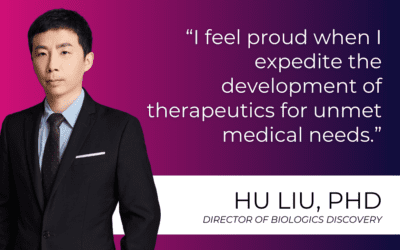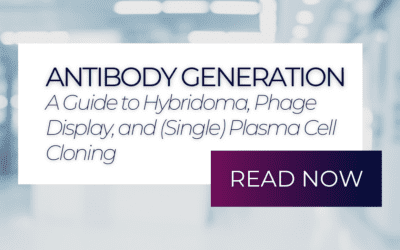In the ongoing battle against cancer, antibody-drug conjugates (ADCs) shine as a beacon of hope. These resourceful molecules combine the precision of monoclonal antibodies with the potency of cytotoxic drugs, making them a formidable weapon against drug resistance and challenging-to-treat cancers. Yet, harnessing their full potential requires more than scientific innovation; highly experienced teams are a necessity, either in-house a the biopharmaceutical organization or accessed through contract research Organizations (CROs).
The Role of an Experienced Team
Every year the development of a clinical drug candidate is increasingly complex, so the selection of a skilled team is paramount. The scientific expertise required when developing efficient ADCs includes:
Scientific Prowess
Developing ADCs demands a deep understanding of various scientific disciplines, including antibody engineering, chemical optimization of linkers, and synthesis of cytotoxic molecules as well as knowledge of the biology and pharmacology associated with a biological target. Extensive expertise and capabilities in all these areas can significantly reduce timelines and improve the efficacy of the ADC. Bonus points if those teams can collaborate together on an integrated project to reduce timelines even more.
Clinical Insight
Oncology is a dynamic field with evolving treatment paradigms. Interpretation of the ever-growing body of clinical data to apply it to ADC development is essential.
Regulatory Expertise
Navigating the regulatory landscape is a formidable challenge. A team well-versed in regulatory requirements ensures a smoother path toward approvals.
Problem-Solving
Challenges are inevitable in drug development. A team of adept problem solvers with significant experience is able to overcome hurdles, find creative solutions, and even identify potential problems before they become problems.
The Role of Contract Research Organizations (CROs)
Having all the required experience to develop ADCs in-house is not possible for every company; however, the relevant expertise can be acquired through collaborations with experienced cCROs. Here’s how they can help:
Specialized Knowledge
CROs often specialize in specific aspects of drug development, such as toxicology, pharmacokinetics, or bioanalysis. Their expertise complements that of the in-house team. Additionally, CROs may offer integrated services to increase efficiency, streamline communication, and provide resources to smaller or virtual companies that need more support and collaboration during drug development.
Resource Efficiency
CROs provide access to state-of-the-art equipment and facilities, reducing the need for substantial in-house investments.
Timely Execution
ADC development requires a multidisciplinary approach, and CROs can expedite various stages of the process, ensuring timelines are met.
Risk Mitigation
By outsourcing certain tasks to CROs, sponsors can mitigate risk and optimize resource allocation.
Case in Point: The ADC Journey
To illustrate the efficiency and benefits of CRO collaboration, let’s take a look at the hypothetical journey of an ADC from inception to clinical trials:
Target Identification
A tenured team oncologists and molecular biologists identify a novel cancer target with therapeutic potential.
Antibody Engineering
Antibody experts design a high-affinity monoclonal antibody that specifically targets the chosen antigen.
Payload Selection
Medicinal chemists and toxicologists collaborate to select an appropriate cytotoxic payload, ensuring it’s potent against cancer cells but safe for patients.
Conjugation Chemistry
Organic chemists and bioconjugation scientists develop the linker connecting the antibody and payload, ensuring stability and controlled release
Preclinical Studies
Animal studies are conducted in AAALAC accredited facilities to ethically assess safety, efficacy, and pharmacokinetics.
Clinical Trials
The experienced team and CROs collaborate on Phase I clinical trials, optimizing dosages and monitoring patient responses.
Regulatory Submission
Regulatory experts guide the team in preparing submissions for regulatory approval and the transition to clinical studies.
Developing Antibody-Drug Conjugates is a multi-faceted journey that requires extensive knowledge of the full spectrum of pre-clinical drug development research. For companies who don’t have these capabilities in house or prefer to outsource, this expertise can be accessed through a collaboration with a CRO with capabilities in all aspects of ADC development. The combined know-how and resources are vital for navigating the intricacies of ADC development, from initial concept to regulatory submission.
In the relentless fight against cancer, the synergy between science, experience, and collaboration paves the way for groundbreaking therapies to improve patient outcomes and transform lives.




